The blockchain is one of the biggest new developments to hit the technological industries in the past few years. This distributed ledger, connected among different users without relying on a single database, is said to be impossible to hack. Yet, technology has much more to offer. Thus, GoodFirms presents blockchain industry trends and research into how other industries can benefit from blockchain tech and what is it going to take in terms of resources to integrate blockchain in their commercial/industrial systems.
Blockchain technology, that started off as a revolutionary innovation for financial and supply chain management sectors, has now taken a more humanitarian form of progress. The blockchain development is slowly paving its way in the government and non-profit sectors as they are highly risk-averse. As payments and money transfers are the largest use of blockchain tech, charities and nonprofits have come to accepting cryptocurrency as donations.
The overhype created about the blockchain innovation is blocking the people to understand its real-world benefits through practical applications. It still remains a fashionable technology. But yes, newer businesses have started applying blockchain rather than just exploring it. They find it easier to adopt this tech.
SURVEY OF BLOCKCHAIN DEVELOPMENT COMPANIES AND EXPERTS
This survey was conducted among 50+ Blockchain Development Firms and experts to get in-depth knowledge of the blockchain scenario. Be it the latest trends, merits & limitations, cost & time taken, preferred tools & platforms for development and so on. Read on to get acknowledged of the statistical blockchain report made from the blockchain experts’ distinct opinions on different applications of blockchain technology.
Here is the full list of Research Partners, who helped us garner participants for this survey, and insights for the research.
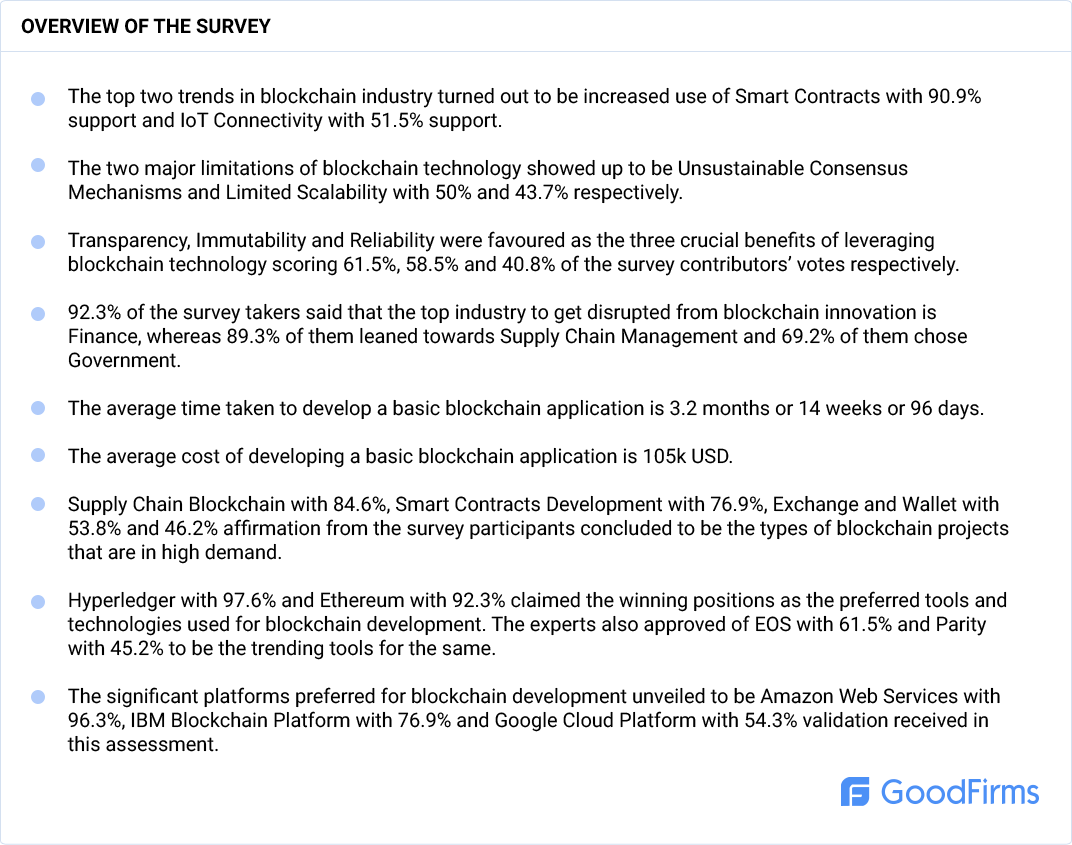
The Detailed Findings
A set of mind-picked multiple choice questions were asked to the blockchain maestros in this blockchain research with reference to the dramatic disruptions that blockchain development has the potential to cause through its applications. What makes this blockchain survey valuable is its eccentricity focusing on numerous other angles other than cryptocurrency, which is highly needed for the businesses who want to take full-fledged advantage of blockchain innovation. Peruse through the graphically represented survey answers and get a clearer understanding of blockchain technology and its development through the blockchain research by GoodFirms below:
1. What are the main Blockchain benefits that can be leveraged by businesses?
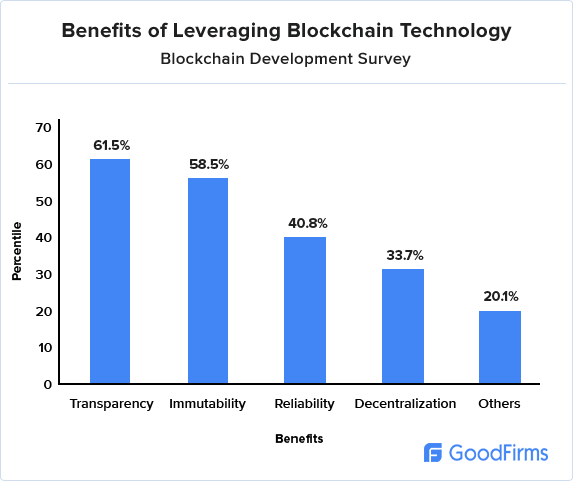
The top four benefits underpinned by the professionals in this Blockchain research as illustrated in the above chart are decoded below:
Transparency and Immutability turned out to be victors earning the affirmation of 61.5% and 58.5% of this blockchain survey participants respectively. No matter what kind of transaction takes place using the Blockchain, the complete transaction history is shared with every peer included in the network. In fact, singular documentation is allotted with all the details in this distributed ledger system making transparency its peak-point among the advantages of Blockchain technology. That also means, that for changing a single transaction record would require the permission of the entire network. And thus, the data on blockchain is more accurate and consistent acing the quality of immutability.
Reliability not staying much farther caught up with reasonable support of 40.8% of the survey takers. The very intention of Blockchain development is to be secure and stable, with a state of Byzantine fault tolerance. And such characteristics are rare particularly in a mobile application, that is in high demand among various businesses. The reliable nature of the blockchain implies that it is reasonable for a wide assortment of uses, from chronicle business and financial transaction to filling in as a platform for record stockpiling and everything in the middle. Any application that needs to store substantial volumes of information can conceivably profit from the reliability offered by the Blockchain technology.
The adjacent blockchain benefit in the top four came out to be Decentralization as chosen by 33.7% of the Blockchain specialists. The one simple fact that the users don’t have to put their trust in a central authority, is the game-changer! It eliminates the chances of your data getting sold to third parties and prevents single points of failure. That implies, a single node going down cannot bring down the whole system, so regardless of what number of users arrive and leave, your applications stay up and running.
The alternate favorable advantages of the Blockchain technology incorporating 20.1% of the votes in the current Blockchain research are cost reduction, security, no intermediaries and automation.
2. Which are the top Industries Blockchain is likely to disrupt?
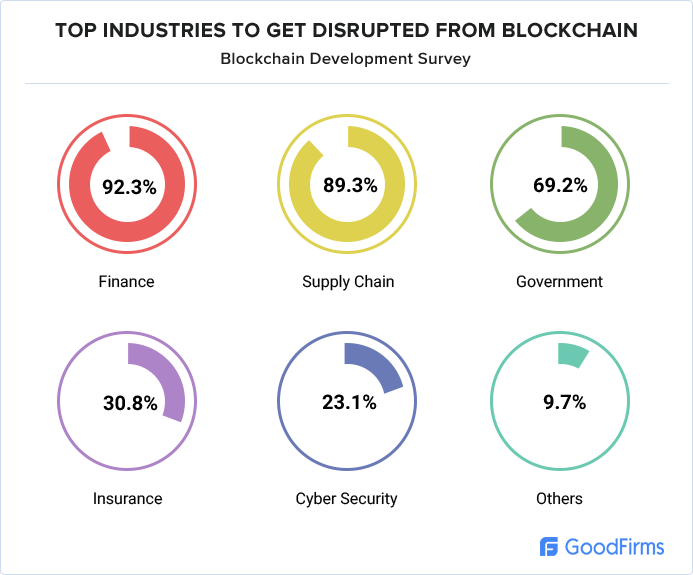
It can be picked up from the above chart that the Finance, Supply Chain Management, and Government industries have been highly determined as the ones that are most likely to get disrupted by the Blockchain technology.
The present structure of the banks relies on a third-party that maintains a central ledger of the transaction records as the banks do not trust each other. Whereas, in the Blockchain domain, each bank maintains its own copy of the ledger. Also, there is no chance of imposing changes in the records because of the transparency rendered by the Blockchain development. It ensures that every member involved knows that everybody is on the same page. There is no room for dispute or error.
And this is the same for all industries integrating the Blockchain technology, regardless of who the stakeholder is - a bank or a product company or a government organization or a service firm and so on. Just have a look at the below diagrams to get a quick understanding of how blockchain is disrupting the current systems and enhancing the security.
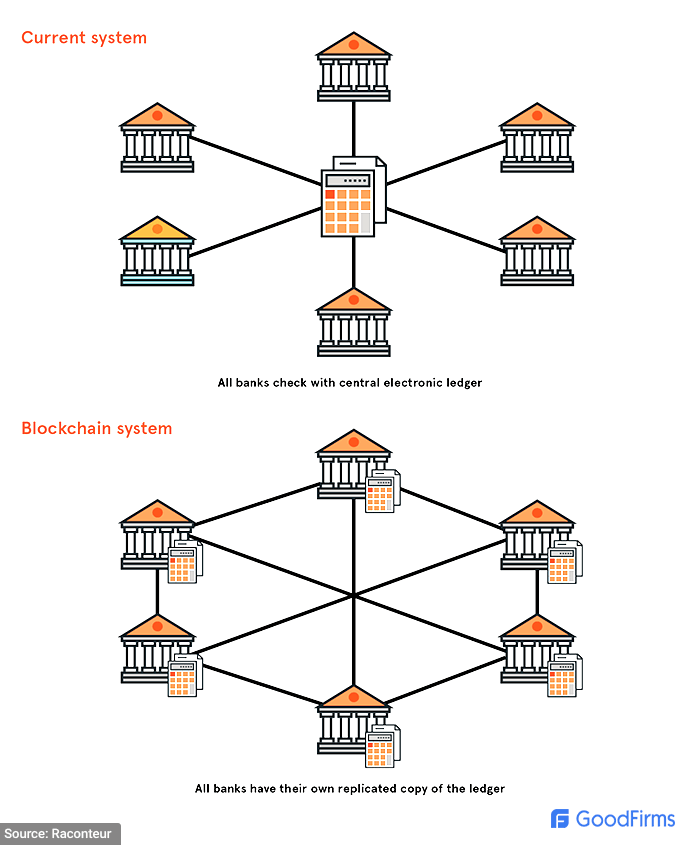
The supply chain tracking that has received second most affirmation from the blockchain survey participants can also reap benefits from the Blockchain innovation. The research shows that the supply chain industry challenges like complicated record keeping and tracking of products can be better-automated by inculcating blockchain development. Provenance tracking of each and every product, cost reduction in moving the items due to real-time tracking and increased trust due to the immutable nature of the Blockchain technology, not allowing to tamper the product numbers is a positive disruption needed in the supply chain management.
For the Government industry sector, blockchain innovation could be used to help reduce and eliminate corruption in government agencies and voting systems. For instance, Smart Contracts can ensure that the government funds are being transferred where they should be and only after achieving a consensus on the details. This will bring high security, transparency, and efficiency that is greatly required in the government sector.
Similarly, in the insurance industry, the Blockchain can help reduce administrative costs via automated verification of claims/payments data from third parties with a trustworthy approach. As the insurance companies will be able to easily view the issuer’s past claims and transactions made on the Blockchain network. This even promotes higher degrees of trust and loyalty between the insurer and customer.
This comprehensive research made it utterly clear that the Blockchain technology can be used in almost any business area including but not limited to Cyber Security, Healthcare, Power Industry, Education, Internet of Things, Authorship and Ownership, Data Management and Online Voting Tools.
3. What blockchain tools and technologies are utilized the most by blockchain developers?
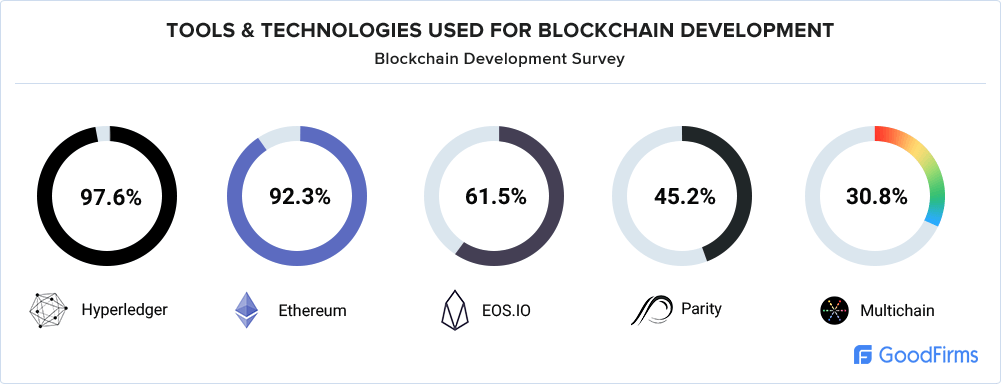
The tools and technologies for any sort of software development is the prima-facie requirement for developers. And a better knowledge in and around these tools and technologies certainly adds to the quality as well as the quantity. In order to be assured of getting maximum returns from the time and cost allotted, it is crucial for businesses to know if their Blockchain partners are utilizing the legit tools available in the market. Thus, the research team of GoodFirms augmented this blockchain research by surveying about the best or rather preferred blockchain tools and technologies by the Blockchain developers. And below is the textual overview of the statistics obtained:
Hyperledger with a strong roger from 97.6% of the participants can be counted as a highly reliable tool. Hyperledger is a multi-project open source collaborative effort hosted by The Linux Foundation and used as a stalwart platform by top hyperledger development companies; is created to advance cross-industry blockchain technologies.
Ethereum not lacking behind at all scored 92.3% affirmation of the survey participants. Ethereum is an open software platform and a distributed public blockchain network that enables developers to build and deploy decentralized applications, simply meaning it is not controlled by any single governing entity.
EOS.IO is a blockchain protocol powered by the native cryptocurrency EOS. The protocol backed by 61.5% of the Blockchain experts; emulates most of the attributes of a real computer including hardware with the computing resources distributed equally among EOS cryptocurrency holders.
Parity that bagged 45.2% support is an advanced technology created by a team of the best blockchain engineers for coding cutting-edge cryptography, cellular system, peer-to-peer technology, and decentralized consensus architectures.
Multichain got the bolster from 30.8% of the Blockchain crowd, which is known to help organizations to build and deploy blockchain applications with speed enduring flexible security. It is also renowned to be developer friendly and customizable among the Blockchain application creators.
Some more tools and technologies with an approximate mention from 17.4% of the participants that also found its way in this research were Hedera Hashgraph, R3 Corda, Credits, Solidity and Truffle.
4. Which blockchain platforms are favored by blockchain developers?
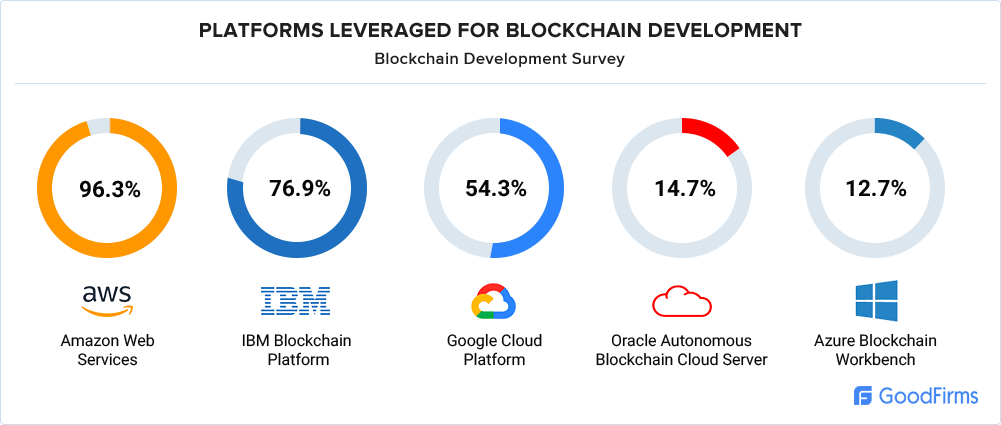
The statistical insights of the trusted and reliable platforms for Blockchain application obtained in this research exhibit that Amazon Web Services is always on priority with 96.3%, IBM Blockchain Platform with 76.9% and Google Cloud Platform with 54.3% endorsement from the survey participants.
The factors that mattered while voting for the blockchain developers are stated below:
- The utility factor had the most impact among the multiple choices considered by the experts in terms of platforms that are leveraged for blockchain applications.
- The other characteristics being flexibility to experiment with different blockchain frameworks and cost-effective resources to quickly deploy and experiment with blockchain networks in minutes, and pay only for what you use.
- And last but not the least, granular security policies offered by the platforms to get a control on the activities carried out by independent users.
Apparently, taking all the mentioned criteria into thorough consideration, the survey takers selected the blockchain platforms they trust the most based on their past experiences
5. How long does it take to develop a basic Blockchain application?
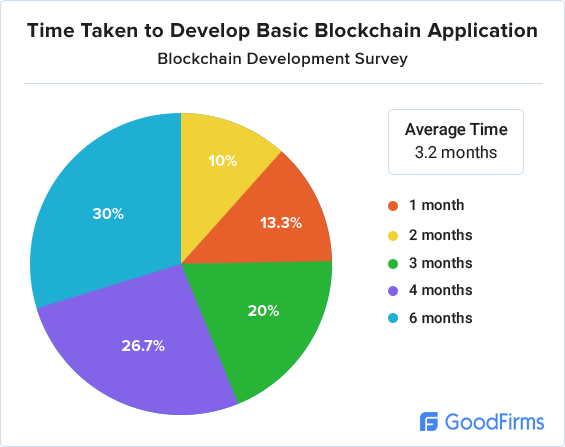
This question was particularly asked to conduct research on the timeframes maintained by different companies belonging to disparate countries for the completion of a basic Blockchain application. And as highlighted in the above chart, the average time period turned out to be 3.2 months or 14 weeks or 96 days. This blockchain research acquired some interesting stats for the time taken as an equivalent percent of participants gave a timeframe of 1 to 2 months and the same happened with the answers - 4 to 6 months. Though the average time frame obtained is 3.2 months, the length of time for the first MVP majorly depends upon your application requirements and the tools & technologies used by Blockchain development partner.
6. How much does it cost to create a basic Blockchain application?
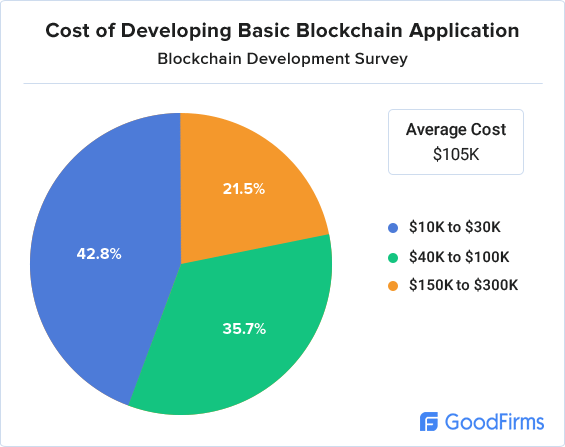
Getting a cost estimate before investing in any kind of new technology is the prime requirement for every business to strategize the next move. And doing so takes ample of puzzle pieces to fit together perfectly including infrastructure, application data structures, business process, legal framework, and marketing strategy. Basically, a business has to be prepared with a definite budget that can create sufficient space for all the mentioned pieces to fit appropriately.
The Blockchain experts belonging to different geographical locations gave their genuine estimates as per their past experiences, and as illustrated in the above chart, the average cost of creating a basic Blockchain application with standard features evaluated to be $105000.
7. What kind of Blockchain development projects are in high demand?
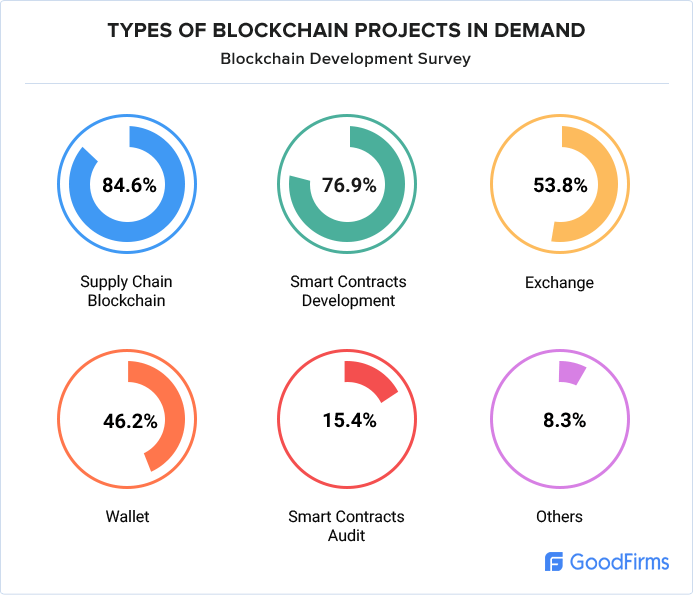
In order to get a clear picture of the connection between the current industries being taken over by the Blockchain tech and the trending projects in the market, the research team of GoodFirms found it necessary to learn about the Blockchain projects that are high in demand. And as per the survey results, Supply Chain Blockchain projects got the highest ratings with 84.6% of the votes making Smart Contracts Development the second highest with 76.9% of the total votes.
The current Supply Chain Management method has become obsolete with additional complexities being added through online shopping. The traditional method could handle and track the one-way chain, that is from the manufacturer to the distributor to the consumers. But the technological advancement in the commerce industry has brought in growing interconnectedness that demands to track and transferring of innumerable records.
The adjoining bogie to the same train is of Smart Contracts Development. The requirement of fast and instant validation - legal and/or commercial has been made possible by the Blockchain technology through Smart Contracts. Executing highly quantifiable agreements with robust criteria acceptance among the parties saving both time and money for businesses has inclined the demand for Smart Contracts projects.
The third and fourth highest ratings were grabbed by Exchange and Wallet projects carrying 53.8% and 46.2% respectively. The revolution in fintech industry caused by the Blockchain technology is no secret. Hence, the cryptocurrency exchange and blockchain wallet that caters the users to buy, sell and monitor the balance for their digital currency, are the Blockchain projects highly demanded by the ICO owners. As a result, the ICO owners are always in the need of top cryptocurrency wallet development companies to give their buyers a smooth experience.
Other blockchain projects like Token Development, Social Identity Management, ICO, Land Registry on Blockchain, dAPPs etc. gained the attention of 8.3% of the survey participants.
8. Which are the two major Blockchain limitations to keep in mind?
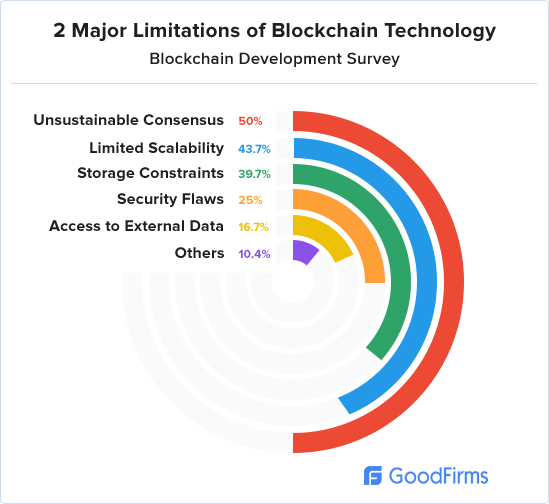
A clear interpretation of the two critical blockchain disadvantages can be seen in the above chart. Unsustainable Consensus Mechanisms with 50% votes and Limited Scalability with 43.7% votes turned out to be the most common issues in the Blockchain technology faced by the developers.
Basically, the Blockchain is based on a Distributed Ledger Technology (DLT) forming a peer-to-peer system with no central authority. This does create a system that is devoid of corruption from a single source, but the blockchain challenge of making faster decisions persists. The consensus mechanism was integrated into the Blockchain development to achieve a dynamic agreement and benefit the whole group of the stakeholders involved considering the majority of votes as the final settlement. But this concept also has a drawback of ignoring the thoughts of the minority group that voted otherwise.
Apart from that, there is an issue of Byzantine Generals Problem (BGP) in this process. Consider the Generals as stakeholders involved in a Blockchain based software. Now, though the majority of Generals will decide what’s best for the whole group and vote in accordance with the best algorithm, there will always be traitor Generals trying to prevent the same, creating instability in the consensus mechanism. This not only creates a lack of coordination among the Generals but also a long time to achieve a settlement that is approved by every General involved resulting in unsustainable consensus. If not done so, the Blockchain technology will not allow the algorithm to function at all, as it requires every member’s consent for the same.
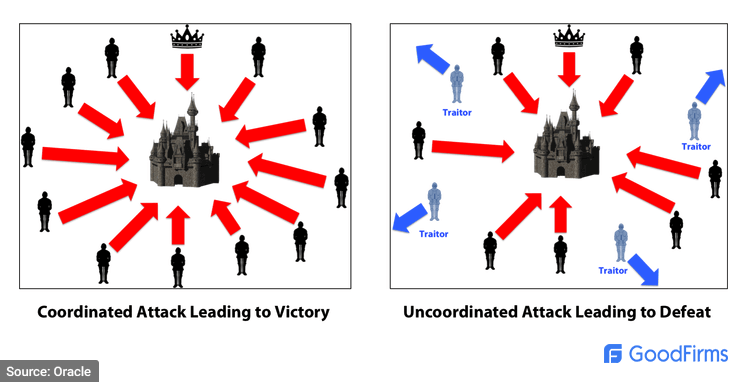
The second major blockchain weakness is limited scalability. The best examples for this issue can be explained by unveiling two major names in the Blockchain business - Bitcoin and Ethereum. Both of the mentioned cryptocurrencies use blocks for a transaction process, and these blocks are limited to a particular size. And hence, only a limited number of transactions per block can be performed. As a result, Bitcoin can handle three to four transactions per second and Ethereum can handle fifteen of the same. This clearly unfolds the restricted status quo of the Blockchain technology and the need for improvement from the Ethereum development companies. The unvarying justification goes for the Storage Constraints as well that was pointed out by 39.7% of the survey participants.
There were two more blockchain limitations highlighted in this blockchain research - Security Flaws by 25% and Access to External Data by 16.7% of the surveyed companies/experts. These comprise of the end-point vulnerabilities where the input and output data gets accessed by the humans through individual credentials and the use of a singular combination of public and private keys that are impossible to guess, but if stolen by a hacker can turn the Blockchain world upside down.
The other blockchain disadvantages encompassing 10.4% of the votes and termed as miscellaneous setbacks in the current survey are privacy, redundancy, excessive network dependency which is not applicable for many business cases, limited maintainability and hard to enhance.
9. What are the top two blockchain trends in the industry applications?
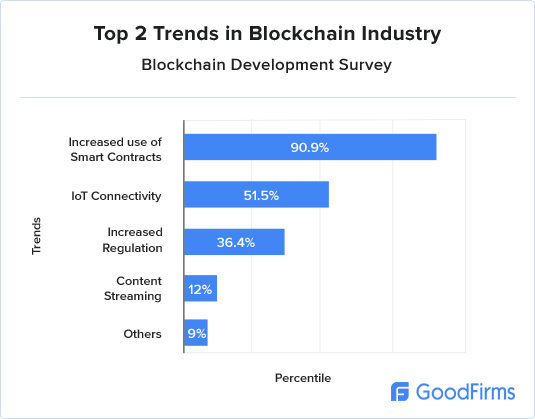
As seen in the above graph, it is crystal clear that the increased use of Smart Contracts and Internet of Things connectivity were right at the top of the minds of the blockchain specialists as soon as the question for top two blockchain trends was popped. Smart Contracts gaining a lion’s share of 90.9% affirmation in this blockchain survey shows that the idea of using computerized contracts stored in the blockchain and their automatic activation on meeting the required conditions is phenomenal. It is eminent that the Smart Contract development companies will be gaining a lot of business.
All businesses whose commercial aspects are greatly dependent on contracts or agreements among several parties can leverage Smart Contracts to a greater extent replacing lawyers. As built on the blockchain, Smart Contracts follows a decentralized system where any single change made will be informed to all the parties mentioned in the contract, and it can be rejected by any of the involved stakeholders. And it is needless to say that you can even receive the documentation instantly skipping the role of involving a lawyer to authenticate it, as it is pre-checked by Smart Contracts.
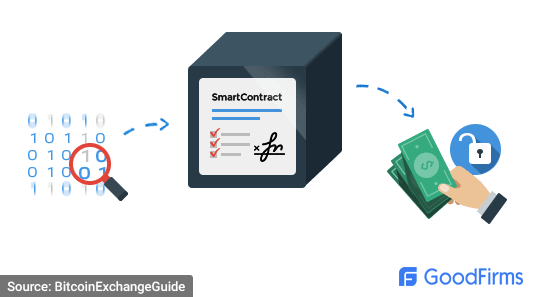
Next comes the Internet of Things connectivity with 51.5% support of the survey takers in this blockchain research. It has turned out that Blockchain is the missing link that solves scalability, privacy and reliability concerns in IoT implementation. The IoT concept gets a much-needed boost from the Blockchain technology in tracking billions of connected devices and enabling robust coordination among them. This also allows for significant savings to IoT industry manufacturers. Moreover, the decentralized approach eliminates the probabilities of single points of failure and the cryptographic algorithms make consumer data more private, creating a buoyant ecosystem for running devices.
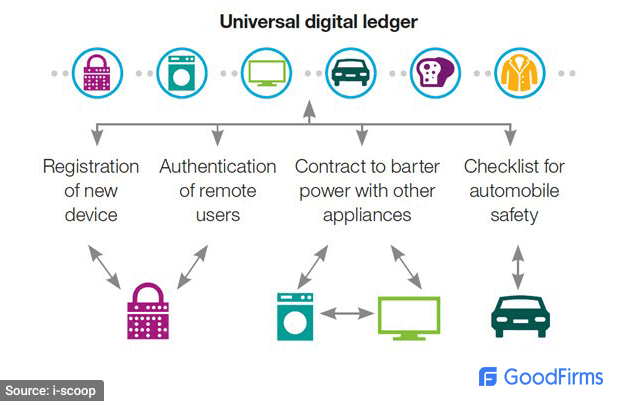
Apart from the two major blockchain trends mentioned above, increased regulation with 36.4% and content streaming with 12.2% have also become a part of the same picture in upcoming Blockchain trends. The transparency and auditability for all the participants in the Blockchain with a promising regulation of the absolute input and output count in a supply chain seem to be a dream come true for regulators.
On the other hand, the Blockchain technology even promises to cut down costs for video content creators which are passed onto them by companies storing these large files on their servers. This enables the content makers to get direct access to their revenue as the Blockchain technology provides a multitude of avenues for video content to be stored and shared under a heavily encrypted and secure system.
10. What is the future of Blockchain innovation?
After enough information getting collected about the ongoing trivia of the Blockchain technology, the research team of GoodFirms took the precious question of the future of this distributed ledger system. To which the Blockchain companies/specialists responded with various conjectures hinged on the current practices and acceptance of the innovation in versatile industries.
A rundown of all the assertive hypothesis about the Blockchain future applications has been disclosed in the research underneath:
- The Blockchain technology will become mainstream and trivial like databases or cloud hosting nowadays.
- From adding security to self-driving cars to eliminating third parties; Blockchain will play a very important role and it definitely will change few if not all industries such as Finance & Banking, Supply Chain, Government, Healthcare, and IoT
- Advancements in the standardization of interoperability among the different blockchains are expected. It is inevitable that there must be several blockchains within a specific business, true benefits for the consumer or enterprise will be realized when they are able to "collaborate" in an open standard. Moreover, more sophisticated consensus algorithms which are power efficient and truly decentralized will be developed to make the systems built on top of blockchain to be more efficient solving the limitation of scalability.
- While World Economic Forum predicts that 10 percent of global GDP will be stored on Blockchains by 2027, interests by several Governments to build POC's around it has already started pouring in!
- Large-scale Banks which were very scared of Cryptos have also started implementing cross-border remittance system emitting positive hopes of continuing the same in future.
- The power of the open protocols of the internet or the blockchain’s core components of algorithmic consensus and distributed record-keeping lies in providing an entirely new paradigm for innovators. Hence, whatever route the Blockchain innovation takes, will be aimed squarely at disrupting many of the gatekeeping institutions that currently dominate a centralized economy.
- It is substantially being predicted by the most Blockchain enthusiasts that Blockchain tech’s major focus will shift from cryptocurrency towards secure and transparent transactions and smart contracts. Something for the cryptocurrency exchange development companies to think about!
Conclusion
This extensive blockchain research must have given you a strong idea with a 360° approach towards blockchain applications and an extra view on time and cost designation for its advancement. Now, all you have to do is pick a reliable blockchain developer from GoodFirms' listing of Top Blockchain Development Companies to incorporate a mature blockchain dependent network in your organizational functions ensuring transparent workflows.



